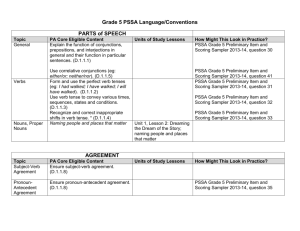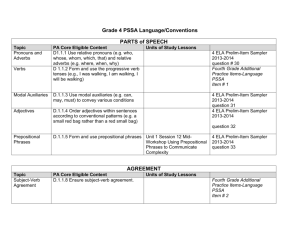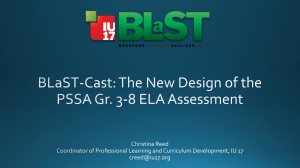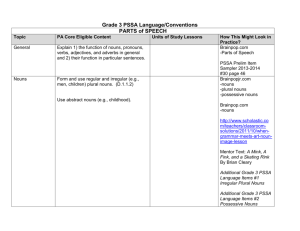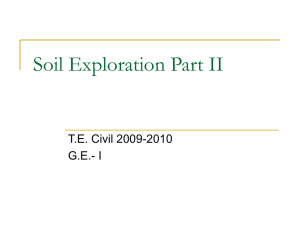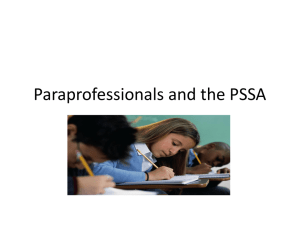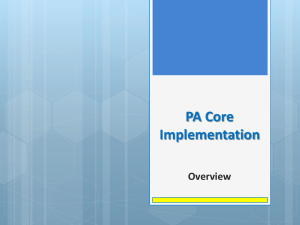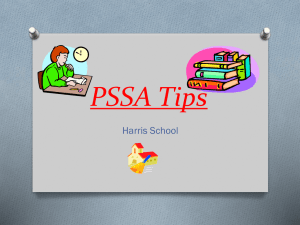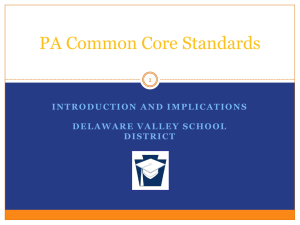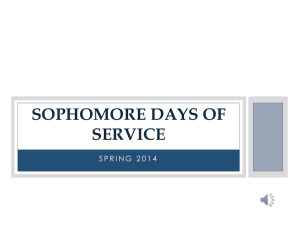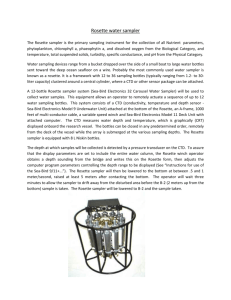Grade 8 October 2
advertisement
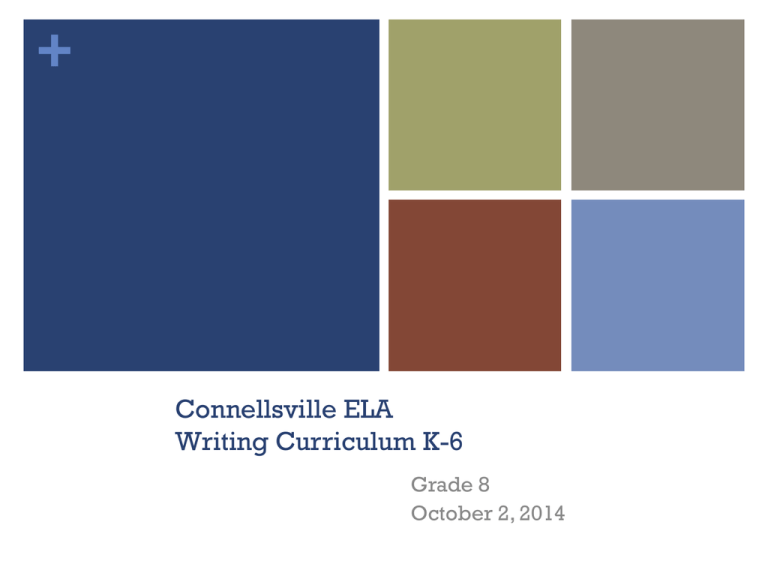
+ Connellsville ELA Writing Curriculum K-6 Grade 8 October 2, 2014 + Agenda Writing Curriculum Questions Adjustments PSSA: What’s New? Text Dependent Analysis (TDA) Evidenced Based Selected Response 2-Part Questions 2-Answer responses Stand Alone Grammar Questions Mode Specific Writing Prompts + Writing Rubric + Functional Scoring Rubric “3” Clear Logical “2” Adequate & Relevant Vague Sufficient Established & Maintained Inconsistent Inadequate Weak understanding Underdeveloped Many errors Text Dependent Analysis TDA + + How does it fit? PA CORE STANDARDS 1.4 Writing + How does it fit? PA CORE STANDARDS 1.4 WRITING CC.1.4.(_).S Response to Literature Eligible Content 1.1.1 to 1.1.6 + What do students need be able to understand and do? Item & Scoring Sampler page 22 Text Dependent Analysis TDA + What does it look like? Grade 7: Read passage beginning on pg. 6 “Mission of Mercy” Grade 8: Read passage beginning on pg. 6 “Joe’s Reward” + TDA Score Point 3 Score Point 2 Text Dependent Analysis + Read: Nail Soup Poem of Stone Soup + How are they going to find the words? Close Reading (AKA: Comprehension Strategies) Contrasts and Contradictions - Again and Again Words of Wiser Beers, Kylene, and Robert Probst. Notice & Note: Strategies for Close Reading. Portsmouth, NH: Heinemann, 2013 + Contrasts and Contradictions • When he came into the room he could see that the woman was not so badly off as she had pretended, but she was a greedy and stingy woman… • “You don’t look as if you could ask anyone to have anything!...” • “She was quite awestruck at the man and his grand connections” • Grade 6 PSSA Item Sampler, pp.7-9 + Again and Again • “But what one has to go without, it’s no use thinking more about,” • “This broth would be good enough… if I had only a bit of___” • Grade 6 PSSA Item Sampler, pp.7-9 + Words of Wiser • “My good woman,” said the man, “you must not be so cross and hard-hearted, for we are both human beings and should help one another, it is written.” • Grade 6 PSSA Item Sampler, pp.7-9 + Two Column Think Sheet What the Piece is About What It Makes Me Think About 1. Battered, torn, hungry, worn 1. Soldiers were tired, hungry, poor? 2. Clever plan 2. “clever” = trick? 3. Soup…with doubt 3. Who is “they”? 4. Herb, meat, carrots, onions 4. Veg soup 5. Completely unaware 5. Townspeople didn’t know about plan 6. Battle won with kindness – greed a distant blindness 6. Soldiers - clever and kind People - no longer greedy 7. Taught: virtue of caring, act of sharing 7. Lesson + Contrasts and Contradictions • When he came into the room he could see that the woman was not so badly off as she had pretended, but she was a greedy and stingy woman… • “You don’t look as if you could ask anyone to have anything!...” • “She was quite awestruck at the man and his grand connections” • Grade 6 PSSA Item Sampler, pp.7-9 + Again and Again • “But what one has to go without, it’s no use thinking more about,” • “This broth would be good enough… if I had only a bit of___” • Grade 6 PSSA Item Sampler, pp.7-9 + Words of Wiser • “My good woman,” said the man, “you must not be so cross and hard-hearted, for we are both human beings and should help one another, it is written.” • Grade 6 PSSA Item Sampler, pp.7-9 + Two Column Think Sheet What the Piece is About What It Makes Me Think About 1. Battered, torn, hungry, worn 1. Soldiers were tired, hungry, poor? 2. Clever plan 2. “clever” = trick? 3. Soup…with doubt 3. Who is “they”? 4. Herb, meat, carrots, onions 4. Veg soup 5. Completely unaware 5. Townspeople didn’t know about plan 6. Battle won with kindness – greed a distant blindness 6. Soldiers - clever and kind People - no longer greedy 7. Taught: virtue of caring, act of sharing 7. Lesson The Lesson is a good place to begin! + 4-Square OrganizerClever Intro Theme: Trick Got people to help make soup out of something that was not food nail or stone. People added stuff – shared without being asked virtue What one has to do without…broth All well fed, happy in the end would be good if only because shared Theme: Don’t be so Used his brain to get people to contribute, didn’t beg, or nag but got cross…all need to share. them to do what he really wanted Lesson: virtue of caring, act of sharing Plan or Trick Kind grand connections – king and queen Very agreeable, make old lady feel special – even got to sleep on her bed! Soldiers hatched a clever plan that townspeople never caught on to Soldiers smiled in silence means they didn’t ruin the lesson by telling people what they did wrong. People want to help out or join in if you are kind Got people to add stuff Plan a secret because people don’t like to be fooled or made to look foolish + Selected Response Questions + What do they look like? Item Scoring Sampler: Grade 7, page 17 Grade 8, page 16 + What do I have to teach? READ DIRECTIONS!! There can be more than one right answer! + Type of Question Main Idea and Key Details: Generalizations, Theme, Central Idea, Claims CC.1.2._.B, Text Analysis Character Traits Inferences Craft and Structure: Author’s purpose Point of View Evidence from Passage: Key Details – Most relevant Line(s)/Sentence(s) /Quote(s) that support answer + Look Closely: Question Response Part One: Which generalization about rowboats is MOST supported by events in the passage? Part Two: Which sentences BEST support the answer in Part One? Choose TWO answers. Rowboats can become unstable with sudden movements. “ ‘Be careful!’ came in a warning from Joe, as the boat began to rock.” “Just then her foot slipped and she fell on the gunwale, causing the boat to tip more than ever.” + Stand-Alone Multiple-Choice Questions Grammar + GRAMMAR + GRAMMAR OE.8. D.1.1 Demonstrate command of the conventions of standard English grammar and usage. D.1.1.1 Explain the function of verbals (i.e. gerunds, participles, and infinitives) in general and their function in particular sentences. D.1.1.2 Form and use verbs in the active and passive voice. D.1.1.3 Form and use verbs in the indicative, imperative, interrogative, conditional, and subjunctive mood. D.1.1.4 Recognize and correct inappropriate shifts in verb voice and mood. D.1.1.5 Place phrases and clauses within a sentence, recognizing and correcting misplaced and dangling modifiers. D.1.1.6 Recognize and correct inappropriate shifts in pronoun and number and person. D.1.1.7 Recognize and correct vague pronouns (.e., ones with unclear or ambiguous antecedents). D.1.1.8 Recognize and correct inappropriate shifts in verb tense. D.1.1.9 Produce complete sentences, recognizing and correcting inappropriate fragments and run-on sentences. D.1.1.10 Correctly use frequently confused words (e.g., to, too, two; there, their, they’re). D.1.1.11 Ensure subject-verb and pronounantecedent agreemtment. + Look Closely: D.1.1.1 In which sentence does the underlined group of words function as an adjective? The student wrote a fascinating story about running her first race. The student wrote a fascinating story about running her first race. Recording the the fish population was the first task of the research study. By attaching a small part to the engine, the mechanic finished the repairs. + Writing Prompts + Item and Scoring Sampler Page 107 Think about a law that is important. It could be a national law, a state law, or a law in your city or town. Consider why it is mportant and how it affects people’s live. Informative/Exp lanatory Write an essay for your teacher that describes an important law and exp0lains why it is important. Be sure to use details and examples why it is important. Be sure to use details and examples to support your ideas. 1. Topic is introduced, developed, and concluded with awareness of task, purpose and audience 2. Organizational strategies and structures that develop the topic 3. Content that demonstrates clear understanding of purpose 4. Elaboration that includes information and support by choosing facts, examples and concrete details. 5. Transitions between and among ideas 6. Formal style with control of language, vocabulary, style and sentence structure and variety 7. Conventions appropriate to level + Item and Scoring Sampler Page 93 Your school is considering a change in the way class presidents are chosen. Some students want to create a small committee which, in turn, would choose the class president. On the other hand, there are those students who want all students in the class to be able to vote for their choice of class president. Think about which method of choosing the class president you believe is the ost effective. Argumentative Write an argumentative essay for your teacher sytating your claim about whether a small committee of students or all the students in the class should be allowed to choose the class president. Be sure to use reasons and evidence to develop your argument.argument. 1. Clear Claim with credible and substantiated argument (you need a counter-argument at this level) 2. Organizational strategies and structures to support claim 3. Content that demonstrates clear understanding of purpose 4. Elaboration that includes a clear position, supported by evidence. 5. Transitions between and among ideas 6. Formal style with control of language, vocabulary, style and sentence structure and variety 7. Conventions appropriate to level + Item and Scoring Sampler Page 119 Imagine that someone became a positive role model for others. Think about what this person might have done to become a positive role model. Consider other people who might have been involved. Narrative Write a story for your teacher that tells how someone became a positive role model for others. Consider story elements (for example, character, setting, and plot) as you evelop yur narrative. 1. Establishes context and point of view that orients reader and introduces narrator and/or characters 2. Story pattern that sequences events 3. Elaboration that supports the purpose 4. Transitional words and phrases 5. Control of literary devices, sensory language, sentence structure 6. Conventions appropriate to level
